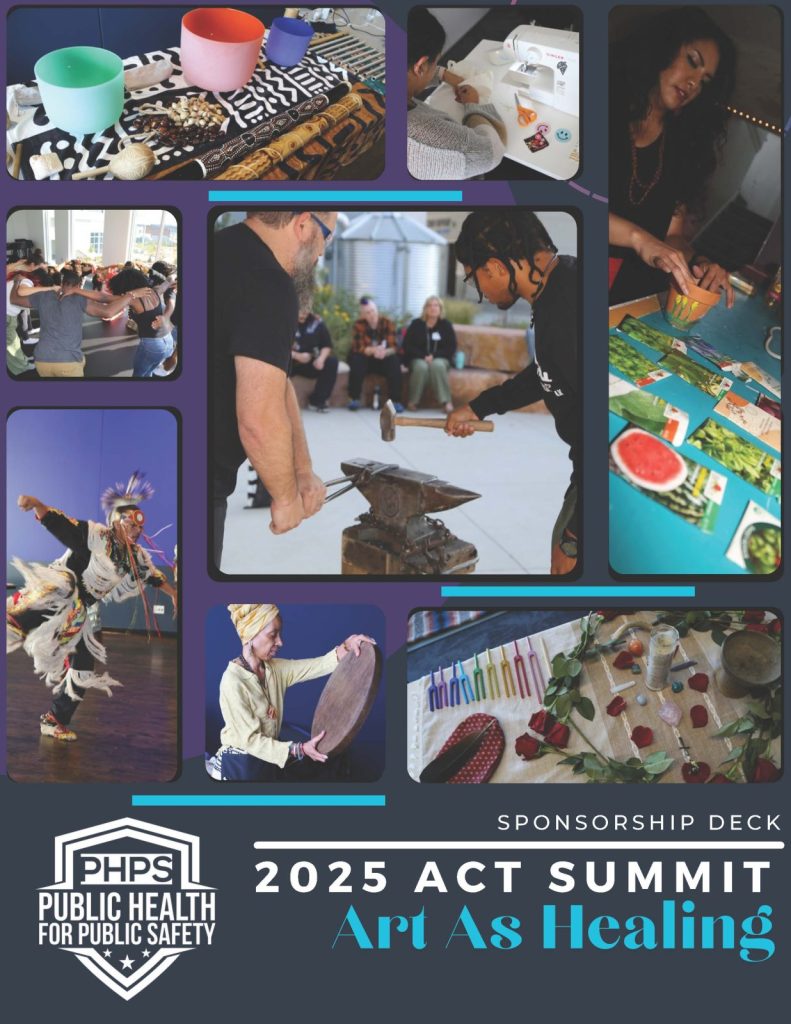
2024 IMPACT REPORT
Active Collective Trauma Summit
ACT Summit 2023 Review
OVERVIEW
The 2024 ACT Summit, held on October 10 11 at the CSU Spur campus, brought together over 150 participants from diverse backgrounds to explore the theme "Matters of the S.E.L.F. – Supporting Everyone’s Life Frequency"
The Summit offered a range of healing sessions, workshops, and opportunities for connection, emphasizing personal growth, collective healing, and cultural inclusion HEALING SESSIONS & WORKSHOPS The Summit featured a variety of healing sessions and workshops that received overwhelmingly positive feedback.
Attendees appreciated the practical strategies for self- care, grounding, and resilience, along with the cultural inclusivity and supportive environments provided by facilitators. Sessions ranged from sound meditation and drumming circles to discussions on resilience and cultural wealth, fostering deep engagement and reflection.
ATTENDEE REPRESENTATION
Participants represented a wide range of roles, including community leaders, public health professionals, educators, and youth. Many attendees brought lived experiences with trauma or supported family members through similar challenges, while others worked professionally in trauma-informed fields. The Summit also saw significant representation of women and nonbinary individuals, along with racial diversity that included Black, Indigenous, Hispanic/Latino, South Asian, and Middle Eastern attendees. Most participants hailed from Metro Denver and Aurora, reflecting strong regional outreach and engagement.
This diversity enriched the Summit’s discussions and activities, ensuring varied perspectives were shared.

2023 IMPACT REPORT
Active Collective Trauma Summit
ACT Summit 2023 Review
Day 1: Discovery
Promote and elevate innate wisdom within communities.
The goals of the first day was to promote and elevate the innate wisdom within communities and knowledge among professions and sectors to inform and cultivate shared understandings around active collective trauma. It included a recap from the 2022 ACT Summit.
Day 2: Engagement
Apply community-centered decision making; elevate community voice
The goals of the second day were to apply community-centered decision making to address active collective trauma and elevate community voice to action. Participants were also encouraged to share resources, opportunities, and skills to cultivate healers and activists in communities.
Day 3: Transformation
Cultivate a platform for community to access consistent supports
The goals of the third day were to cultivate a platform for community leaders, dwellers, healers, and activists to access consistent supports and services to sustain healing and community-driven systems change. The Summit also celebrated community voice with a BBQ, live music, and communion with youth.


2022 IMPACT REPORT
Active Collective Trauma Summit
Active Collective Trauma (ACT) The partnering agencies of the Denver Office of Social Equity & Innovation, the Public Health Institute at Denver Health, and the Denver Office of Behavioral Health Strategies hosted a series of events that addressed the topic of Active Collective Trauma, defined as:
Multigenerational trauma experienced by a specific cultural, racial, or ethnic group. It is related to events that oppressed (and continue to oppress) a particular group of people because of their status as oppressed, such as Genocide, Homicide, Enslavement, the Holocaust, Forced Migration, and the Violent Colonization of Native Americans. For many groups this trauma actively continues today in the form of enduring, endemic, and systemic racism, which is typified by practices like redlining, gentrification of historically minority communities, hate crimes, denial of oppression, victim blaming by the dominant group, and police brutality. These types of practices are driven by the legacy, and continued influence, of white supremacy, leading to a situation where all parties live inside a system that creates collective trauma for all.
ACT Committee Goals and Evolution
The ACT committee set out to achieve an innovative and groundbreaking approach to bringing the collective knowledge of the community together to address a concept that evolved into the recognizable title of ‘Active Collective Trauma’. From our earliest conversations about what this community engagement effort would look like the primary goals were to:
1. Learn about the trauma that has been endured
2. Explore current practices that have been influenced by the experience (e.g., parenting, coping strategies, communal collaboration, religion, music, etc.)
3. Work together collaboratively towards healing
4. Address the separate (but related) issue of Continuous Traumatic Stress
5. Providing pathways to encourage and support more culturally relevant healing therapies within communities of color

